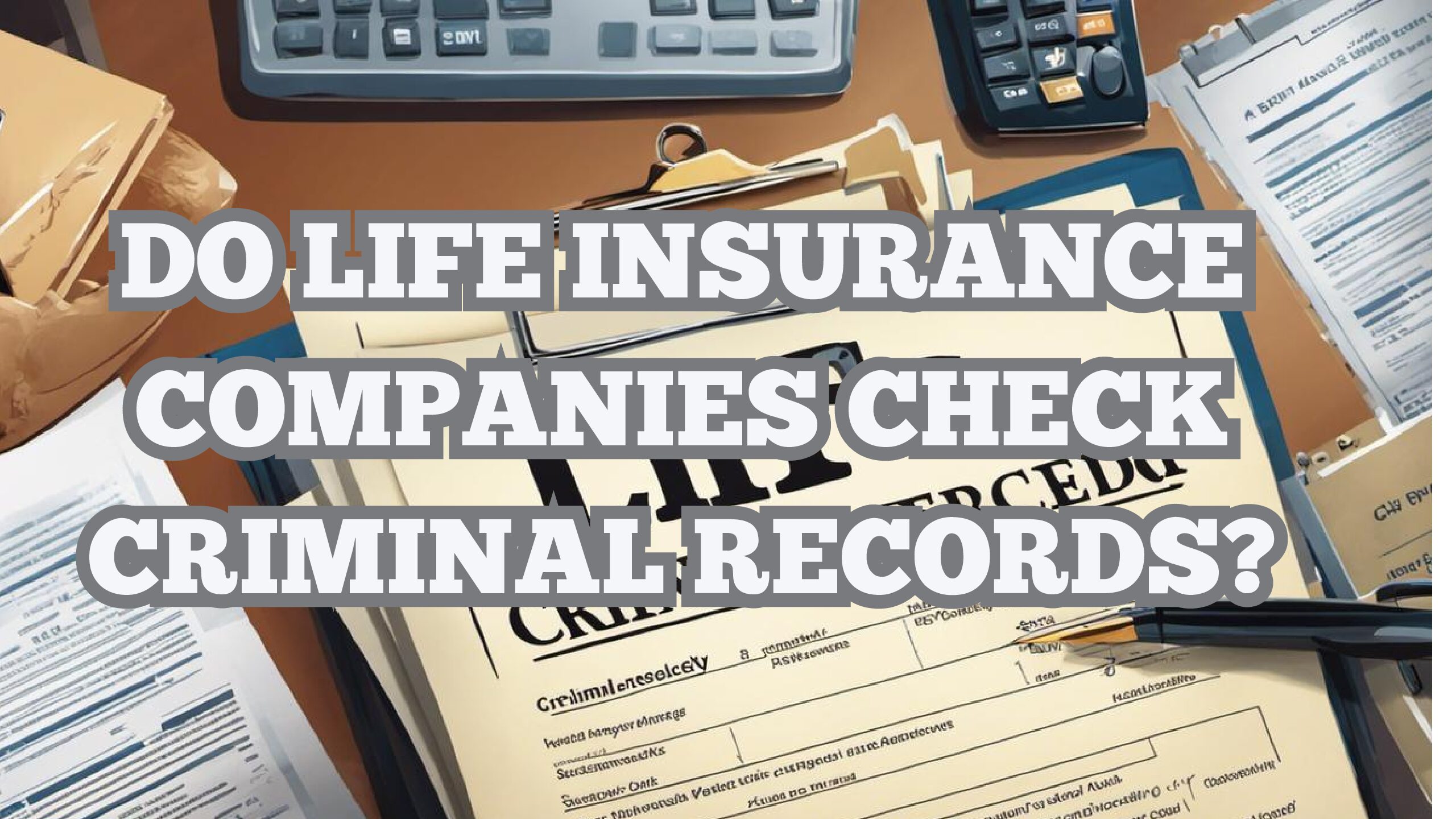
DO LIFE INSURANCE COMPANIES CHECK CRIMINAL RECORDS
Understanding life insurance and its underwriting process can be an overwhelming task for many individuals, as the different types of policies will vary greatly in what is offered and how they will work. It is very important to understand who qualifies for such coverage and the qualifications that insurance companies usually factor in during this underwriting process.
An often overlooked detail in this procedure is the receipt of personal information, particularly criminal records, on an applicant’s potential approval. This post sheds light on why insurers might be interested in an applicant’s criminal history and how it can potentially impact their insurance application. First though, the basics…
What is Life Insurance?
Life insurance is a form of contract wherein an insurance company agrees to pay a specified amount to the beneficiaries of the policy in the event of the policyholder’s death. In general, there are two main types of insurance: term life insurance, which provides coverage for a specific period of time, and permanent life insurance, which provides coverage for the lifetime of the policyholder. The payout, or death benefit, is typically paid out tax-free and can be used by the beneficiaries for any purpose, from replacing lost income to paying for funeral expenses.
Who Can Apply for Life Insurance?
Anyone can apply for life insurance coverage, although the underwriting process may vary significantly from one individual to another. During underwriting, life insurance companies consider a number of factors to determine the risk associated with insuring a particular individual and to set the premium rates for the policy. These factors generally include the applicant’s age, sex, health status, lifestyle, and sometimes even occupation.
What is the Application Process Like in Order to Get Life Insurance?
The application process for life insurance warrants (bad word) the need to gather extensive personal data on an individual. This can range from your medical history, lifestyle habits, and possibly even criminal records. Companies venture into such thorough investigations to evaluate the potential risk tied to an applicant.
The goal for these companies is accurate risk assessment. They have to gauge the probabilities of an individual passing away prematurely, thereby mandating them to cash out the insurance policy earlier than projected. Understanding these nuances makes the entire process more transparent, helping you make more informed decisions.

WHY DO LIFE INSURANCE COMPANIES CHECK CRIMINAL RECORDS
It essentially comes down to risk assessment, as applicants with a criminal record may be perceived as high-risk. Insurance firms often base their decisions on the theory that individuals with a history of risky behaviors (evident from their criminal past), might have a higher chance of dying early and thus, triggering an early payout of the death benefit.
Factors suggesting a high-risk lifestyle, such as a history of substance abuse (reflected in DUI convictions), or potential stressors such as pending criminal charges, can significantly affect an individual’s overall health and expected lifespan.
Consequently, this can influence the underwriting process, impacting the applicant’s eligibility, the insurance policy’s terms, and the premiums required. However, the specific impact of a criminal record on a life insurance application can vary based on different insurance company policies and what specifically is contained within the applicant’s criminal record.
You may also want to check out…. CAN YOU GET LIFE INSURANCE IF YOU HAVE A FELONY?
Furthermore, applicants with a history of certain types of crime (like fraud or financial crimes), can be considered as potential threats to the insurance company. Therefore, honesty and disclosure are highly advised when supplying information for insurance applications as every detail could influence your eligibility for a policy.

HOW DOES YOUR CRIMINAL RECORD AFFECT THE LIFE INSURANCE POLICY
As part of the application process, life insurance companies typically conduct thorough background checks on their potential customers. Your medical history, lifestyle, and even your criminal record, if you have one, are all taken into account.
Just like most employers or housing rental agencies, life insurance providers see criminal records as an important piece of information in underwriting. They assume a possible correlation between criminal activity and mortality rates, which tends to increase the perceived risk linked to those with a criminal record. Understanding the underwriting process helps to delineate how criminal records affect an individual’s ability to obtain life insurance coverage.
Insurance rate setting and eligibility determining are two major steps of the underwriting process. Among the risks evaluated, criminal records can significantly influence the final decision, though their weight varies depending on the insurer. Based on statistical evidence, those with a criminal record tend to face higher life insurance premiums compared to their clear-record counterparts.
Yet, it’s worth mentioning that insurance companies consider the criminal record alongside other risk determinants such as health status, age, and lifestyle habits.
Understanding and Overcoming the Challenges
Despite having a criminal record, securing life insurance isn’t entirely impossible. It largely hinges on factors such as the severity of the crime, how much time has passed since the crime, and whether the individual has shown evidence of rehabilitation.
For example, a DUI conviction may have less impact on your premiums than a felony conviction. Case histories also demonstrate instances where applicants with minor offenses successfully secure coverage, albeit at elevated rates. Essentially, while having a criminal record can affect the process, it doesn’t necessarily disqualify you from obtaining life insurance.
HOW DO YOU SECURE A LIFE INSURANCE POLICY IF YOU HAVE A CRIMINAL RECORD

Anyone seeking life insurance must be aware that insurance providers employ varied criteria in assessing the risk associated with a prospective policyholder. In that regard, criminal history is oftentimes taken into account.
A criminal background is seen as an indicator of potential ‘risk’ and thus may influence your eligibility for coverage, as well as the premiums you pay. The strictness of these underwriting policies can vary from company to company. For instance, some insurance providers might associate a potential impact on lifespan based on certain behavior patterns tied to a criminal record, thereby classifying it as a risk factor. However, there are few steps you can take to find coverage even if you have a criminal record.
The first step is to be honest about your past with your insurance agent or broker; any discrepancies discovered later can lead to a denial of a claim. It would be beneficial to work with an experienced insurance agent or broker who is well-versed in finding life insurance providers that cater to high-risk applicants. They can guide you to companies less likely to heavily weight criminal records in their risk assessment.
Additionally, life insurance companies that specialize in offering coverage to high-risk individuals might be a suitable option. These companies have more experience dealing with applicants with complex histories, and are often willing to provide coverage, albeit at a potentially higher rate.
Remember, while mainstream insurers may charge higher premiums, it is worth noting that rates can decrease over time, particularly if there is a significant period of time since the conviction and no recurrence of criminal behavior.
These steps offer a solid starting point for understanding and overcoming the challenges of securing life insurance with a criminal record. Armed with this knowledge, individuals with criminal records who are seeking life insurance coverage, can empower themselves through knowledge and as a result, informed decision-making.
By recognizing the potential for higher premiums, the possibility of seeking out insurance companies that specialize in high-risk applicants, and the value of partnering with a savvy insurance broker, insurance-seekers can successfully maneuver around the challenges that come with criminal records.
At its core, this all underscores the importance of being upfront and proactive when looking to protect the well-being and financial security of an individual, irrespective of their past and when dealing with a criminal record.
-The Educated Felon











Leave a Comment